
Of all the people we’ve interviewed over the years, Rabbi Sharon Kleinbaum’s one of the most inspirational. And awesome.
A spunky, socially aware New Jersey native, Kleinbaum currently presides over New York’s queer-inclusive synagogue, Congregation Beth Simchat Torah.
Aside from her Orthodox upbringing, Kleinbaum cites her background in Yiddish literature as one of the reasons why she chose to become a rabbi.
Said the jarringly young looking 49-year old:
I actually first seriously started considering Rabbinical school while I was teaching Yiddish literature. I thought I could teach Yiddish literature to a community without a religious background, but ultimately Yiddish is so infused with Judaism that it’s really hard to really deeply understand Yiddish just as a language, because it isn’t simply a language: it was embedded deeply in a culture, and that culture included Judaism, and you can’t parse them out without bleaching out from all of them really the power of what they are.
Now, years on, Kleinbaum uses her position and moral authority to fight injustice, like anti-gay legislation. In fact, the good Rabbi found herself behind bars last year for a Times Square protest against Don’t Ask, Don’t Tell, which prohibits openly gay Americans from serving in the military.
Our editor recently headed over to CBST to chat with Kleinbaum on the nature of religion, how she reconciled her faith with her lesbianism, Sarah Silverman’s “Great Schlep” and why religious leaders must talk politics.
Read all about it, after the jump…
Andrew Belonsky: First, what is religion to you?
Sharon Kleinbaum: For me, there’s no difference between religion and spirituality. It’s creating a place to ask the biggest questions about who we are, the meaning of life, the purpose of our life here and how we understand ourselves in the larger universe.
AB: And of course that universe encompasses the nation in which one lives – and that includes politics.
SK: Oh, absolutely. It has as much to do with our internal lives and our sense of interior integrity as it has to do with the world around us and how we function in that world and our responsibility therein. I believe that religion can be a liberating force for transformational change for the individual on a personal, internal level and on a national and international level.
AB: I read a quote from you in which you talked about how all institutionalized religious gatherings should be used to discuss politics. Politics is essential for religion, you think?
SK: Absolutely. I don’t see them as separate things. If we define politics as how we organize our society – which, fundamentally, is what it’s about – then the principles of a deeply religious life – and, again, I don’t distinguish between religion and spirituality. Both religion and spirituality are about comforting us and giving us a sense of peace. Sometimes it’s about demanding of us to do more, to take action, and sometimes it’s about inspiring us to rise above our small universe of personal experience and make a statement or take action on a larger one. So, it’s about comforting us and giving us both hope and inspirational belief in a future.
AB: A few weeks ago, a group of socially conservative preachers had “Pulpit Freedom Sunday” in which they endorsed a candidate. First, what do you make of laws that prohibit religious figures from using the pulpit to endorse a candidate, and, also, what are your thoughts on that action?
SK: Well, right, I’m not prohibited personally from endorsing a candidate, and if you look at the site Rabbis for Obama, I’m on that list. I don’t lose my freedom of speech because I’m a Rabbi. I support the idea that from bima, from the pulpit, I can’t say, “Congregants, vote for [x],” but that’s hardly a limitation. We’re allowed to discuss fully and completely issues that are of concern to our congregations. I recognize that other people will disagree with me on certain issues, but that’s the beauty of diversity. I’m willing to take them on and debate them, but I’m not willing to say that a synagogue or a religious institution should be denuded of concerns for the political sphere. The limit is just on endorsing a candidate. I don’t think that’s such a big limitation. But I think the movement was kind of silly of them.
AB: Do you think it was just for press?
SK: I don’t know. I can’t speculate. But I do respect their right to have a position politically based on religion, I just don’t want to take their position on. I think there should be progressive religious voices like mine and many others who can debate them on their terms and say, “Okay, you have a right to your interpretation, but it’s an interpretation. You can’t say you have the last word on God’s word.”

[Kleinbaum and former National Gay and Lesbian Task Force director Matt Foreman before being arrested during a “Don’t Tell” protest.]
AB: Are you optimistic about the Middle East?
SK: I am an optimistic person – that means I can’t really explain it, but, yes, I am. I’m now forty-nine and I’ve been involved in Middle East politics for a long time and I know personally there are really good and decent people struggling for an honest and fair and just and secure solution to a very complicated problem. Unfortunately, there are a lot of evil forces and a lot of politics that have gotten in the way.
AB: When you say “evil,” do you mean forces of darkness or what we as a society equate with evil? Do you believe in evil evil?
SK: I do believe there’s evil in the world. I think most people don’t fall into that category. The question for me is not – you can’t take on the places in which real evil exists. You can take on the fertile middle ground. There’s a huge middle ground – and Israel’s a fantastic example. There’s a huge middle ground in the Palestinian population, in the Israeli, Jewish population. The question is, “How fertile is that middle ground for ideas of hatred and fascism and of evil.” It’s like Germany – yeah, I think Hitler was evil, but the question is, “Why was the German society at large such a fertile ground for those ideas?” And that’s a much more interesting question, because I do believe there are evil ideas, there are evil people in the world, so we have to wonder when those questions take hold and when is the ground fertile for them? What do we do about that? If the ground isn’t fertile, those ideas stay pretty weak. So, yes, there is evil in the world, but I do believe in the possibilities for transformational change, and I think religion should be a force for liberation, not a force for hatred and oppression.
AB: Do you think religion needs a larger role in politics? Obviously it comes up a lot in American politics?
SK: America is a religious country. It has been from its founding, and I think there needs to be a greater voice for progressive religious voices. Progressive voices have, by and large, been shy about being out there and saying, “Hold on, I believe in God, but the God I believe in actually cares about the poor, actually cares about equality.” The problem I feel is that progressive voices in this country have not had the platform or the focus or the organization or the media attention – so I don’t think it’s necessarily a problem with religion. I think the problem is that the right wing in this country in this last period of time has been ascendant. And it’s true not just in religion.
AB: Did you hear about Sarah Silverman’s Great Schlep?
SK: Yes, I did. I saw it.
AB: What was your take on that?
SK: It’s very funny, because I had this idea of doing “Schlep The Vote,” as a contrast to Rock The Vote. Well, I thought it was great, I thought her idea was great to get grandchildren to get their grandparents to really consider seriously Obama. And I think, frankly, there’s a lot of racism within the Jewish community that needs to be confronted, and I’m convinced that a lot of the caution about Obama among some people in the Jewish community is concern about the fact that he’s a black man. So – anything that confronts that and starts that discussion in whatever form, I think is a healthy one. On the other hand, by the way, the Jewish Caucus – Jews vote in Congress much more closely with the Black Caucus than any other group in Congress and Jews vote overall, as a group, much more for the Democratic party much more than any other single group in America.
AB: Growing up – how did you reconcile your sexuality with your Judaism?
SK: I grew up in Rutherford, New Jersey, which is right outside of New York City, and I went to an Orthodox Yeshiva, which is called Frisch Yeshiva High School of New Jersey. In many ways, it was a wonderful place to be a teenager, because boys and girls were not supposed to have any physical contact, and I was seen as being very religious, because that was very easy for me. In fact, I think it was a very healthy way to be a teenager – for the straight kids, too. The emphasis was on groups and group activity – there were no dances where people had to worry about being asked. I think I actually had a lot of safety because there was no pressure on me to be a certain kind of girl; there was no pressure on me in terms of boys, no pressure on me to be successful by being hooked up with the right boy. And, frankly, I watch what goes on with teenage culture, and it’s horrible. It doesn’t matter what somebody’s sexual orientation.
AB: It’s a terrible, terrible time.
SK: And, you know, a big part of that is forcing kids to grow up sexually too quickly and to prove themselves. So, I left Orthodoxy when I left for college, and I did it for several reasons. I was very disillusioned with the Orthodox world’s insular attitude and I was very committed to social justice – there were many different reasons. Ultimately, as I look back, I understood that there would be no long-term place for me as a lesbian. It was very painful, because I felt very much at home in the Orthodox world and I was very much a part of it. It was very much like losing a family for me. So it was – I felt that I had to, at that point, this was 1977, I really felt like I had to choose. There was no way to stay in the Orthodox world and find my way to be a healthy adult sexually. That took years to work out. Even when I went to rabbinical school, there were no openly gay rabbis and no openly gay students. But the Jewish world, when I look back – I came out in 1977 – the Jewish world has changed enormously. And, ultimately, it’s about people coming out, people knowing us, people seeing us up close and getting a feel for who we are as human beings.
AB: What did your parents say?
SK: Well, my parents are not Orthodox, so that wasn’t an issue. My parents were very concerned that I would lose all my friends. My father’s concern was for my safety – my physical safety and my emotional safety, but after a few years they came around. Now they’re active members – well, my father has passed away, but they were members of our synagogue, my mother still is, my father’s buried in the CBST cemetery that we have in New Jersey. They’re both extraordinary people and I think their biggest concern was worry for me, which I think is true of many parents, but they express it in different ways.

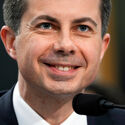

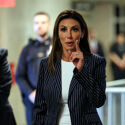



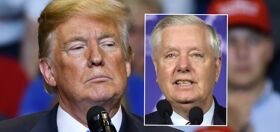


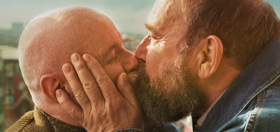
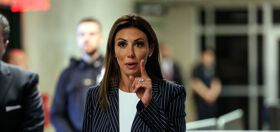

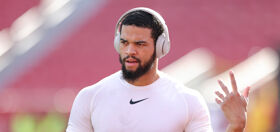
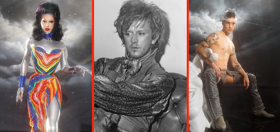

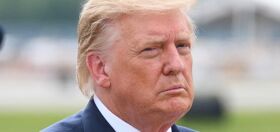
Sarah Siegel
Thanks for your spiritual, social-justice-focused leadership, Rabbi Kleinbaum!
And Shabbat shalom!
— Sarah Siegel, proud congregant of Rabbi Kleinbaum’s synagogue, along with my partner Pat Hewitt, since our move here from Chicago in 1996.